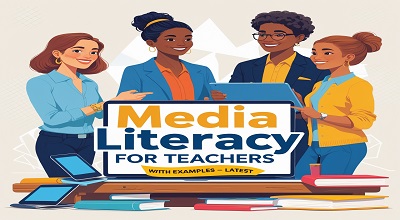Media Literacy for Teachers
Media literacy refers to the ability to access, analyze, evaluate, create, and act using all forms of communication. In today’s digital age, where information is abundant and often misleading, media literacy has become a crucial skill for both teachers and students.
Teachers play a vital role in helping students navigate the complex media landscape. By fostering media literacy, educators empower students to think critically about the content they consume, distinguish between credible and unreliable sources, and become responsible digital citizens.
Why Media Literacy is Essential for Teachers?
Media literacy is no longer optional—it’s a necessity. Here’s why teachers must prioritize it:
A. Combating Misinformation
With the rise of fake news and deepfakes, students must learn how to verify information before accepting it as truth.
B. Encouraging Critical Thinking
Media literacy fosters analytical skills, helping students question biases, motives, and the credibility of sources.
C. Promoting Digital Citizenship
Students learn ethical online behavior, including respecting intellectual property and understanding digital footprints.
D. Enhancing Engagement
Incorporating media into lessons makes learning more interactive and relevant to students’ lives
Key Components of Media Literacy
Media literacy consists of several core skills:
A. Access
Locating and retrieving media content from various sources (websites, social media, news outlets).
B. Analysis
Breaking down media messages to understand their purpose, audience, and techniques used (e.g., persuasive language, imagery).
C. Evaluation
Assessing the credibility, bias, and accuracy of media content.
D. Creation
Producing responsible and ethical media (blogs, videos, infographics).
E. Reflection
Understanding the impact of media on society and personal beliefs.
How Teachers Can Incorporate Media Literacy in the Classroom?
Here are practical ways to integrate media literacy into teaching:
A. Teach Source Evaluation
- Use the CRAAP Test (Currency, Relevance, Authority, Accuracy, Purpose).
- Compare different news sources on the same topic.
B. Analyze Advertisements
- Discuss persuasive techniques in commercials.
- Have students create their own ethical ads.
C. Use Social Media Critically
- Examine viral trends for authenticity.
- Discuss algorithms and echo chambers.
D. Encourage Student-Created Media
- Assign projects like podcasts, blogs, or videos.
- Teach copyright and fair use principles.
Examples of Media Literacy Activities for Students
A. Fact-Checking Exercise
Provide students with a news article and have them verify facts using Snopes or FactCheck.org.
B. Bias Detection in News
Compare coverage of the same event from different outlets (e.g., Fox News vs. CNN).
C. Meme Analysis
Discuss how memes spread ideas (and misinformation) rapidly.
D. Digital Storytelling
Students create short films or presentations on media literacy topics.
Free Download: GRID Legends APK
